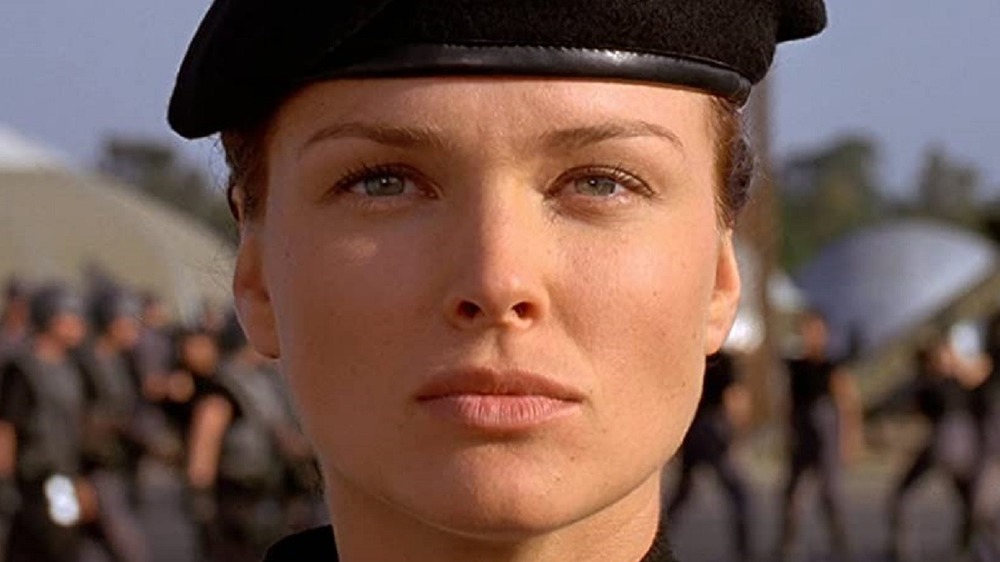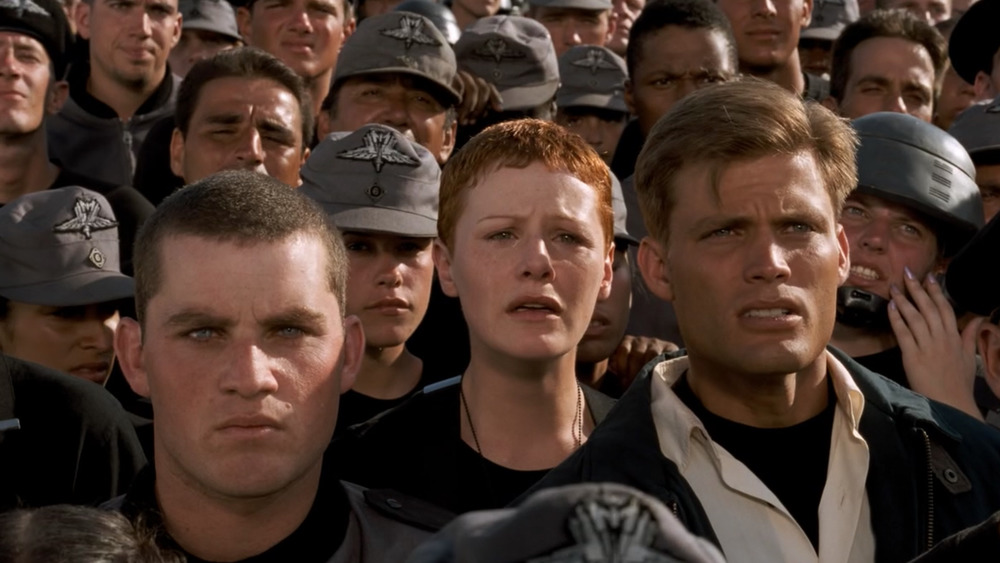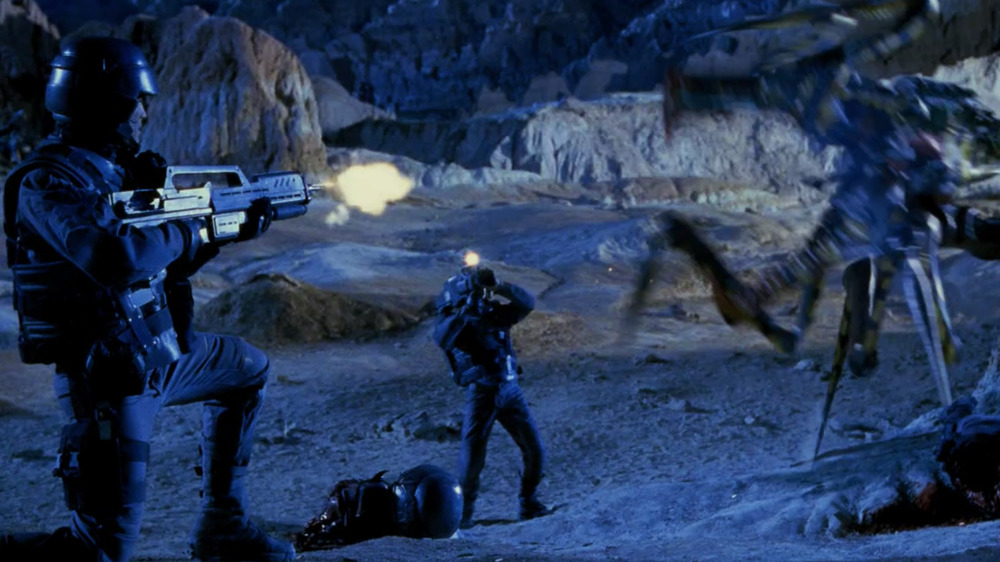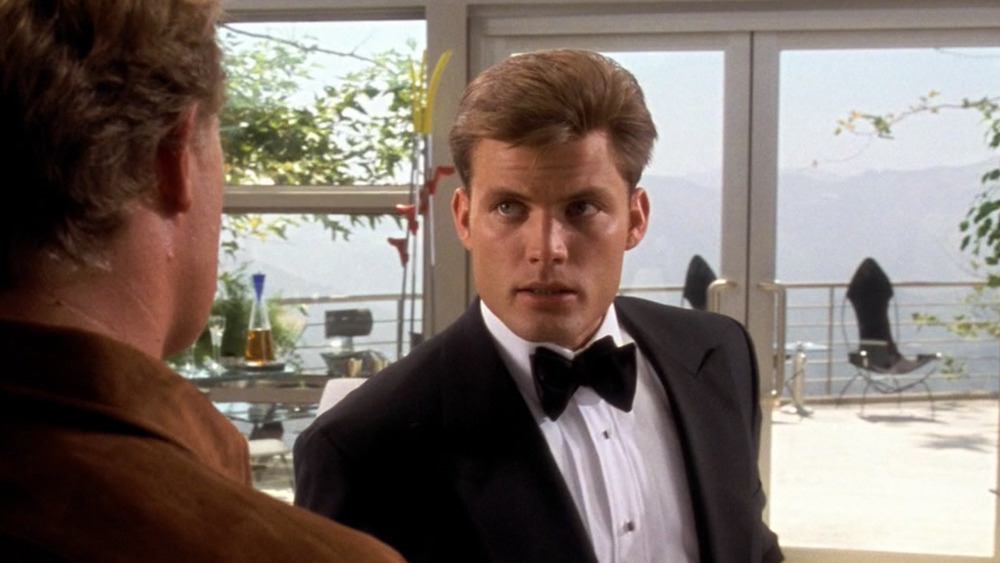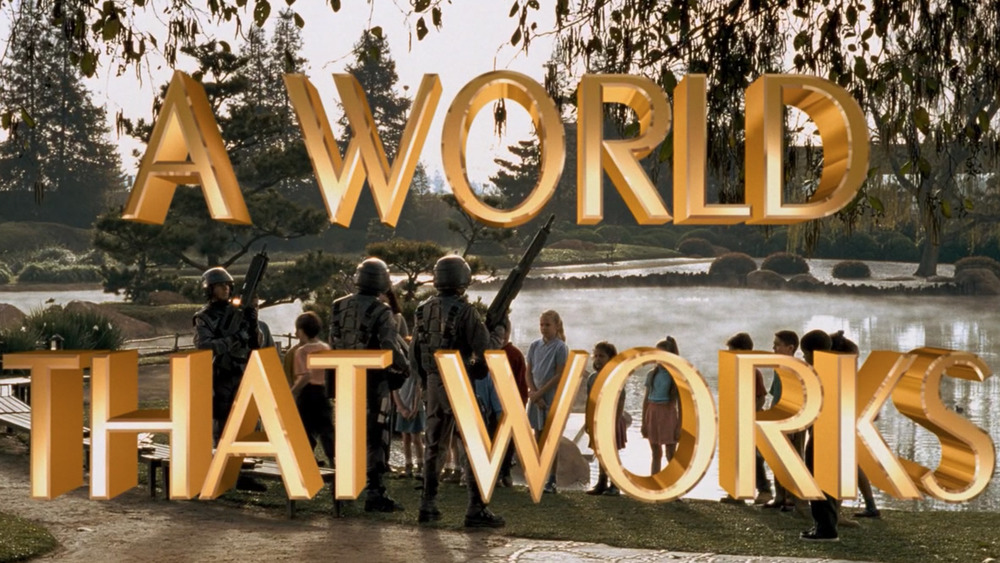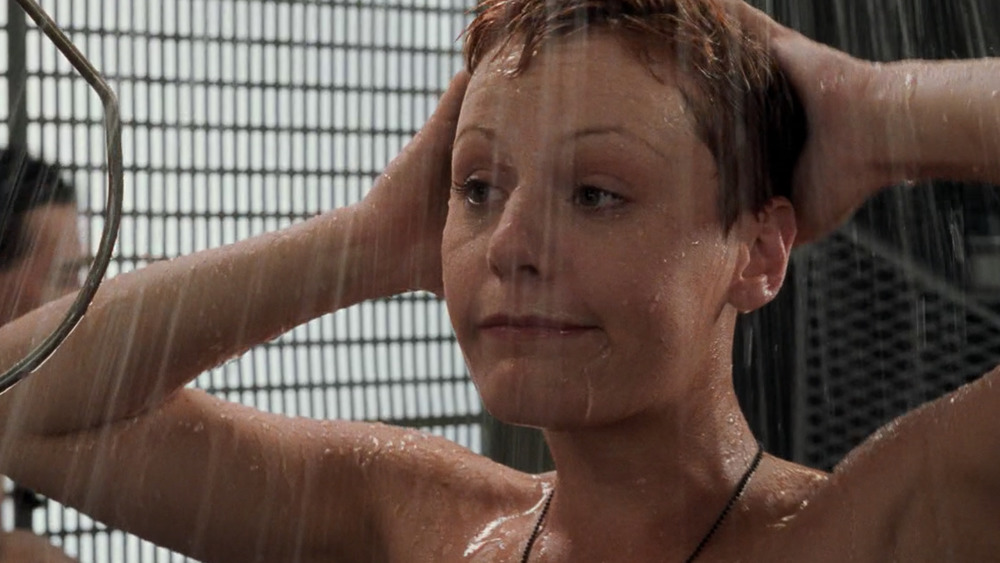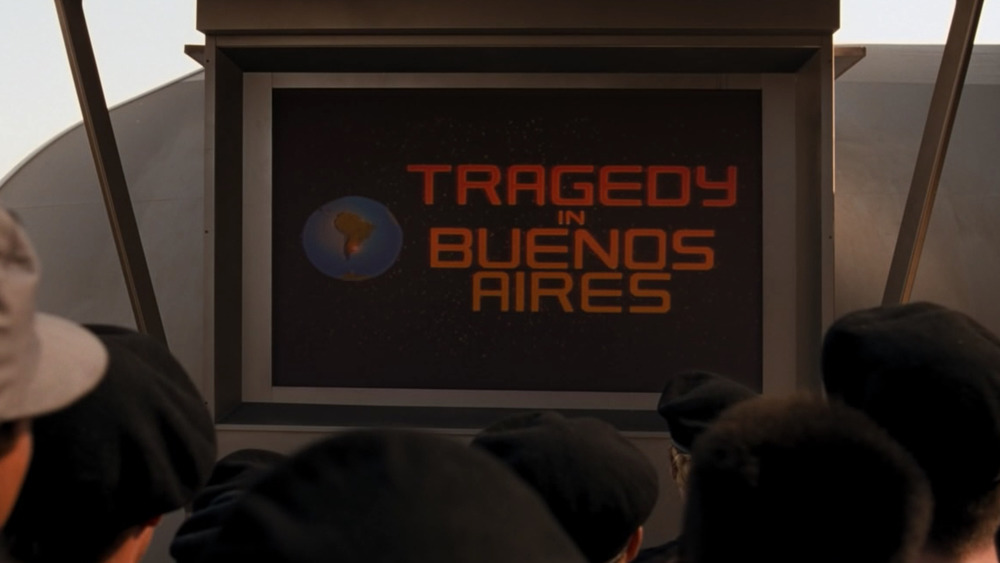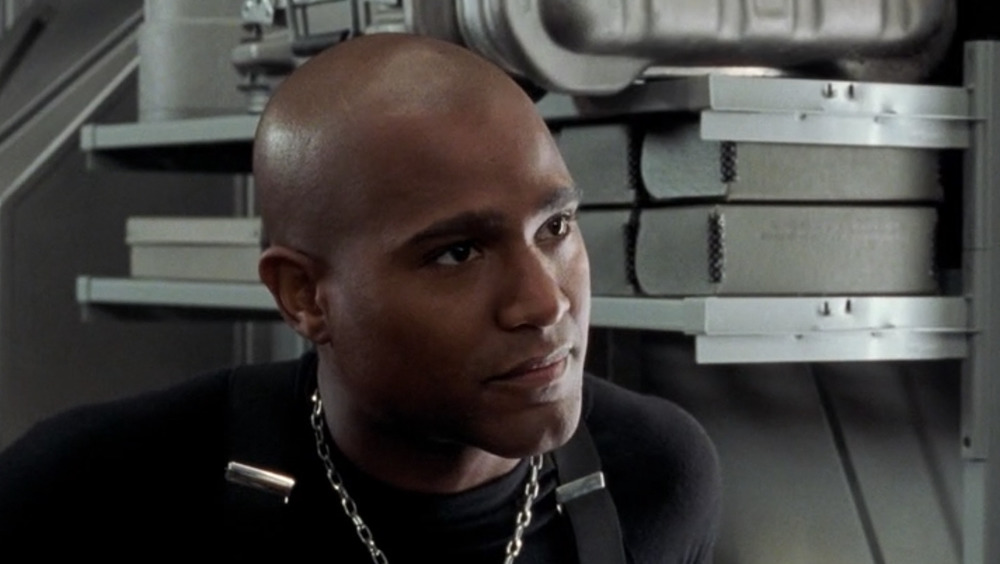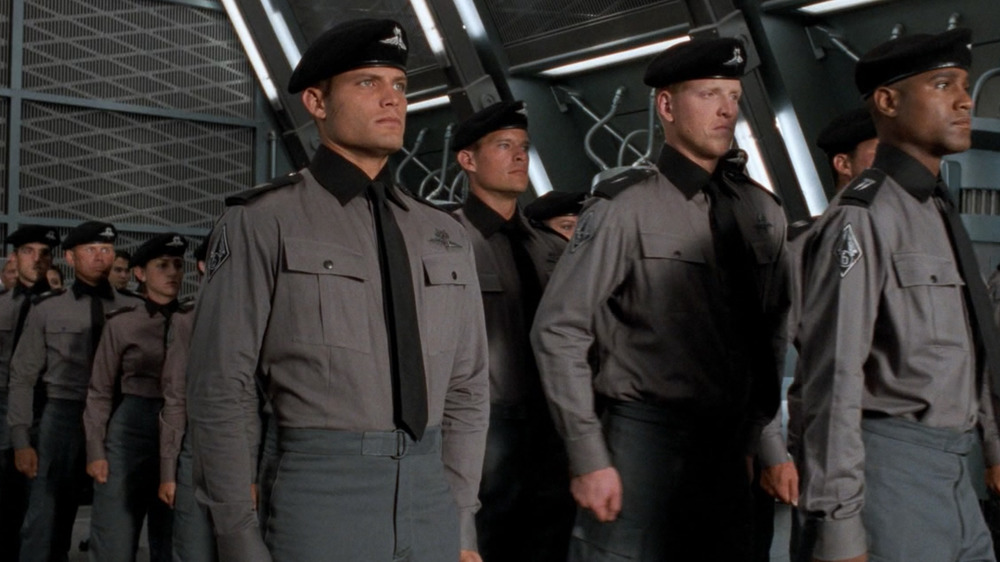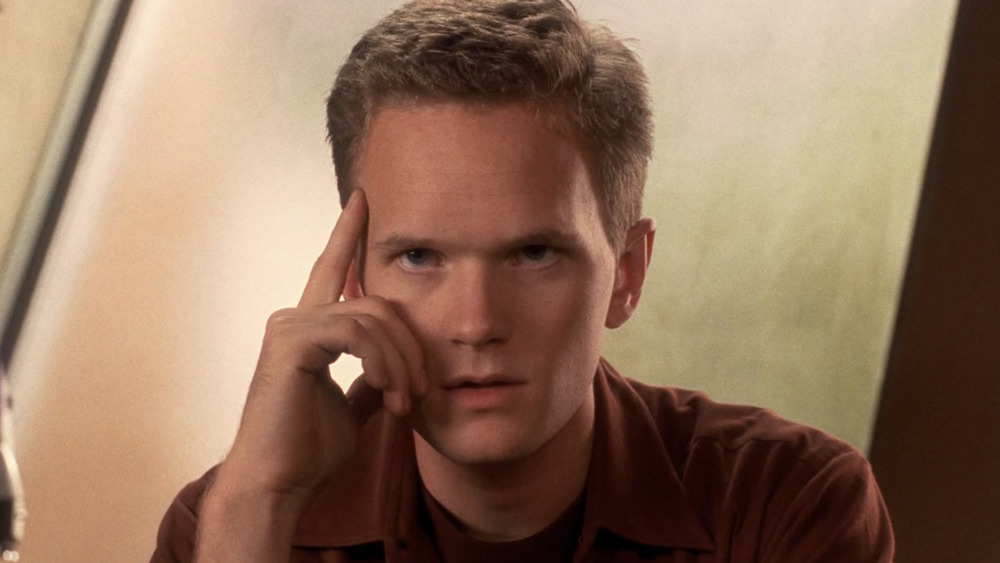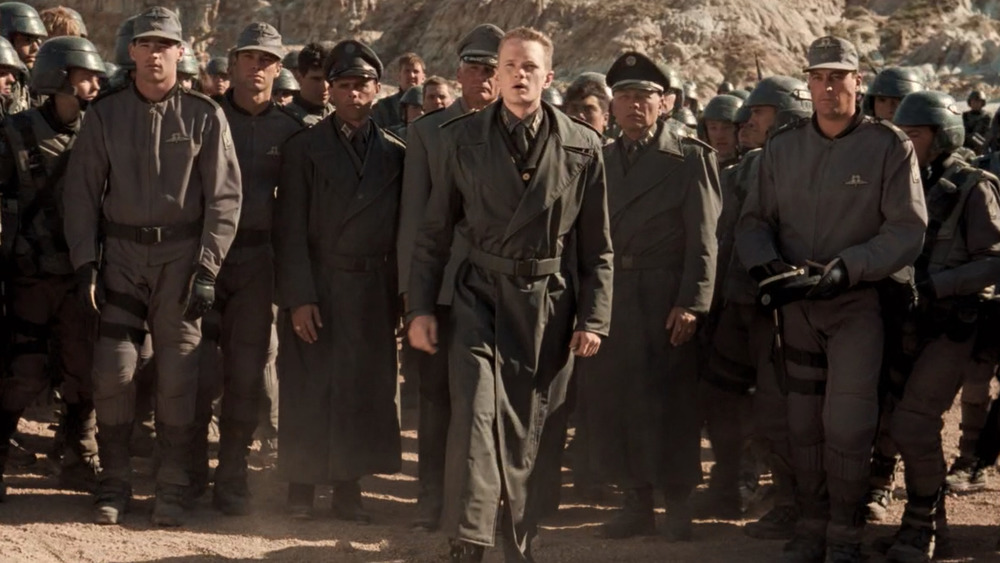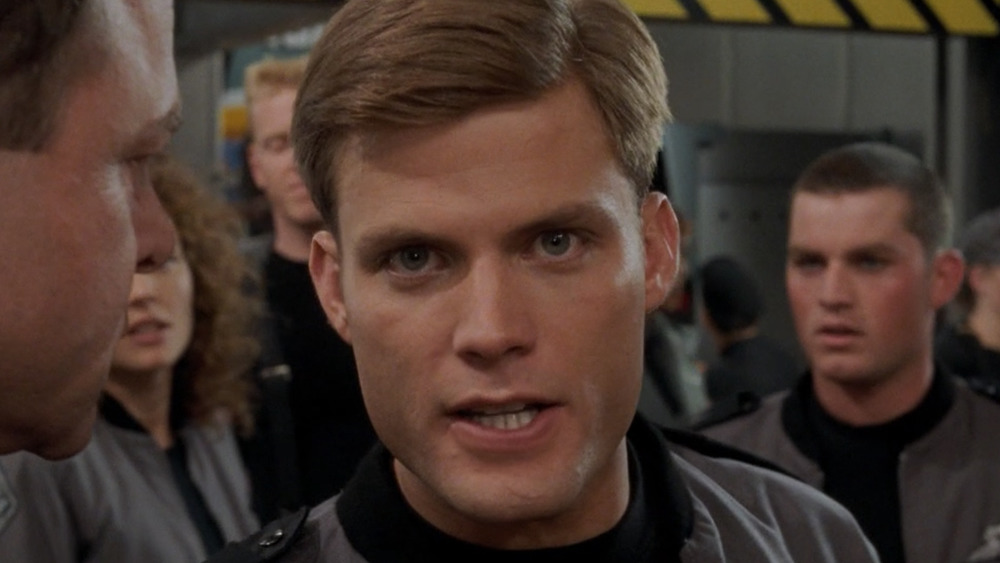Small Details You Missed In Starship Troopers
"The only good bug is a dead bug!" That sentiment generates waves of late '90s nostalgia for anyone who had a VHS player and watched Johnny Rico battle some oversized arachnids in Starship Troopers. The film is a big-budget, sci-fi extravaganza years ahead of its time. Sure, it was a major bomb — both financially and critically — when it hit theaters in 1998. But in the decades since, its reputation has majorly grown. Plus, even back in the '90s, the film was nominated for an Academy Award for Best Visual Effects, and the CGI bugs are even more vivid today.
Starship Troopers featured a cast of then-unknown names, such as Casper Van Dien, Denise Richards, and a baby-faced Neil Patrick Harris. They were all starring alongside Total Recall alumni Michael Ironside, who was reteaming with director Paul Verhoeven to traverse the solar system once again. As for the plot, Starship Troopers follows a group of recruits in a future society consumed by its own military complex, leading to some amazing battle sequences against gigantic, vicious alien bugs. However, all the violence and nudity in the film can distract from the nuances that Verhoeven injected into his adaptation of Robert Heinlein's 1959 novel, and as a result, there are some small details you might've missed while watching Starship Troopers.
Starship Troopers is a satire about the military complex
Starship Troopers goes to work right away, shaping its viewers' brains into the ideal mindset for a soldier. The opening scenes feature commercials from a 23rd-century regime known as the United Citizen Federation. The clips vary from information on the savagery of the arachnid enemy to positive outcomes for enlisting in the military. The not-so-subtle brainwashing leaves you confused about your feelings towards Starship Troopers, and that's helped this cult classic shine brighter over the years. The military propaganda videos are truly a unique form of satire, one that becomes more transparent with each viewing.
Paul Verhoeven claimed to have only read a couple chapters of the source material before retiring it to the dust bin. In an interview with Empire, he explained, "It's a very right-wing book. And with the movie we tried, and I think at least partially succeeded, in commenting on that at the same time. ... All the way through we were fighting with the fascism, the ultra-militarism." Rather than glorify the book's fascist elements, Verhoeven pulled us into the muck with an awareness of something being terribly wrong with this totalitarian society and its military obsession.
Its satirical attributes are constructed so well that it's easy to miss the film's intentions — presenting late-stage fascism on a cosmic scale. These details even sailed right over the heads of many critics who accused Verhoeven of being a neo-Nazi. They completely misunderstood his achievement in taking fascist rhetoric and dressing it up in satire as a warning.
News cameramen of the future are incredibly gutsy
The opening segment of Starship Troopers teases us with news footage of the battlefield, where soldiers are engaged with savage alien arachnids. The bugs are ripping through the infantry with ease, spewing fountains of gore across the screen. Our primary protagonist, Rico (Casper Van Dien), is delivered a major blow from his adversaries before the intro sequence fades out to a more peaceful time, before all the mayhem on the bugs' planet, Klendathu. When we do return to the same scene later on, we get a different view of this same battle through the eyes of the soldiers, complete with shots of the cameraman who captured the carnage in the propaganda video we saw earlier. Our primary concern is Rico, so it's easy for this news cameraman's bravery to go unnoticed.
While troops are unloading magazines at their enemy, the man holding the studio camera is standing directly next to the bugs. He's maintaining a steady frame, aiming his camera at the towering creature in front of him, oblivious to the possibility of decapitation by his subject. The soldiers in the Federation army are the bravest of the brave, but we're much more impressed with the unarmed journalist's dedication to his craft. He's determined to get his shot no matter the cost. The man shines his camera lights directly in the arachnid's face and doesn't flinch as bullets wiz by and dismembered limbs rain down around him. There's little notice taken of his death, but we know who the hero is in this story. There are numerous ways to die for the cause, and the news cameraman goes out in a barrage of cinematic glory.
Rico is a rich kid
According to Starship Troopers, Earth in the 23rd century looks to be a lavish time to live, complete with sleek technology and bright, shiny lights. The central plot follows Rico closely while he reaches his decision to enlist in the military, along with his girlfriend, Carmen (Denise Richards), and his best friend, Carl (Neil Patrick Harris). From this narrative viewpoint, the people of Earth look like they live a cozy life. In reality, we're seeing the lifestyle of someone in a much higher tax bracket. The tax plans in Starship Troopers' world aren't explained to us, but noticing the little details makes it clear that Rico's parents are left with plenty of scratch.
Rico's home is a spacious house with towering, crystal clear windows, perched atop a mountainside. The future looks wonderful from the viewpoint of the wealthy. Also, lending credence to Rico's financial upbringing is his father's counter-argument for enlisting. Rather than doing his part for society, Rico's dad would rather him go on vacation with the family before beginning his first semester at Harvard, neither of which are available to those from meager means. When Rico is in basic training, he's also called out for his upbringing by his squad mate, Ace (Jake Busey). "You rich kids are all the same," he states, in response to Rico's certainty about becoming squad leader. Leave it to the gangly goofball to see through our hero's posturing and recognize the silver spoon he was fed by.
Starship Troopers' world-building is done through propaganda
Starship Troopers does such a fantastic job of world-building that you won't even recognize it's happening. In the same way that new recruits are brainwashed into operating the cogs of war, we're subjected to the same devices to help us realize the sordid reality of this future. The propaganda commercials aren't presented as though the characters are watching them at the moment, but as if the filmmakers are recruiting us to learn more about the world they created. And laced throughout Starship Troopers' informative commercials are details about the vastness of this universe. When we aren't getting battle advice, we are presented with inter-planetary diagrams and Earth politics.
The commercials have a slightly humorous characteristic to them, but don't let that distract you from seeing the bigger picture. The small details in each quick segment expands on the world of Starship Troopers. It's through these moments that we learn about the location of the bug planet, foreshadowing about smart bugs, Earth's war council decisions, and more. It's here we get to see the fascist bureaucracy in action, and we see a world where the media is controlled by the state. We know creating a mental block when seeing commercials is instinctual for most denizens of the 21st century, but we recommend paying attention to these ones. Who knows, you may even see something you want to know more about.
You need a license to have kids in Starship Troopers
As it stands today, we're approaching an Earth population of 8 billion souls. The exponential growth will likely lead to gigantic numbers by the time we hit the 23rd century. On a planet led by a reactionary military government like in Starship Troopers, you'd think officials would enact a type of control for population growth. Turns out there is one succinct chunk of dialogue that informs us of the bureaucratic path towards parenthood in this future. It's buried in a scene that every single viewer remembers ... and not for its informative dialogue.
The communal shower scene in Starship Troopers has become its most conversational segment. The casual nudity in this scene distracts from all the world expansion presented through the dialogue. One of the soldiers begins asking his squad mates their reason for enlisting in the military. Among the answers are career ambitions, college funding, and civic duty. However, there's one especially interesting answer from a female soldier, and it involves a desire to have children. As she explains, "It's a lot easier to get a license if you serve." That tells us that not only do you have to register for a license in order to have kids, but it's also not a sure thing and requires proving yourself to society. It's something to think about while sitting in bumper-to-bumper traffic.
News reports are assembled in seconds
Rico is delivered a tough blow when he loses a soldier while leading his squad through a training exercise. We could argue about how the man's helmet wouldn't have done much to protect him from a bullet to the face, but that's of little consequence. It's what happens after Rico signs his letter of resignation that's interesting. After the incident, he admits defeat and calls to inform his parents he's coming home. The call ends with daylight slowly being snuffed out over his mom and dad before the signal goes dead. The reasoning behind the signal loss is explained so quickly that you might miss, and it comes so fast because, evidently, news stations have a magical ability to assemble coverage instantaneously.
As soon as Rico grabs his bag to leave after his phone call, troops begin rushing to the command center to take in the news of a bug meteor that's decimated Rico's hometown of Buenos Aires. The time between the phone call with his parents and the news being reported is less than a minute. Not only that, but in this span of time, the war council has gathered and decided Earth is officially going to war with the arachnids of Klendathu. In a population obsessed with military might, political bureaucracy moves much quicker when war is involved. The reaction to the meteor strike on Buenos Aires happens so fast that you have to wonder if the government knew it was coming and saw it as a desirable outcome. There's no better way to whip your population into a frenzy and march them into battle.
One line of dialogue tells us how joining the mobile infantry saved Rico's life
What better way to spend your summer vacation after high school than by sunbathing in an exotic destination? Rico's father knows how to sell an idea, and he does so by using a vacation to Zegema Beach as incentive for not enlisting in the military. "I've always wanted to go there," Rico states while attempting to hold back his smile. The gambit doesn't pay off for his father, though, and Rico takes off to chase tail into the battlefield. However, this location comes into play later in the film, and it tells us with certainty how Rico was destined for the military.
The bug meteor that strikes Buenos Aires obviously thrashes any hopes of returning home for Rico, but news about Zegema Beach also tells him how enlisting in the mobile infantry literally saved his life. When the core characters are placed in a new squad, one of the new team members states he's from Zegema Beach. Rico tells him about how he's "always wanted to go there." The gruff soldier (played by The Walking Dead's Seth Gilliam) turns and gravely informs him that "it's not there anymore." This means Rico would've died if he had made any other choice but join the mobile infantry. He would've been hit by the meteor in Buenos Aires, or he would've been at Zegema Beach when it was destroyed. Enlisting was the only way for Rico to avoid certain death. Looks like signing up to dodge bullets was the best way to dodge a bullet.
Being a citizen means more to this society than being a person
In the United Citizen Federation, becoming a citizen is paramount. Citizenship comes with a highly sought-after level of respect in this society. It opens pathways financially in the same way that it does in current times, but the future residents of Earth view it as the only respectable way to become a contributing member of society. The most definitive statement in regards to attaining value in this world comes from the funeral for Dizzy (Dina Meyer), when Rico is giving his eulogy.
"Dizzy was my friend. She was a soldier. But more than that, she was a citizen of the Federation," Rico declares emphatically, moments before casting Dizzy's casket out into the cosmos. The heartfelt speech is filled with emotion, and it's also a declaration on what's required to garner respect. It isn't enough to be a good friend. Being a soldier is admirable, but it's more about the path it creates — a path towards the ultimate goal of upgrading from simply being a civilian to being a citizen in the Federation. Individuality is of little importance, and your life is only given value when offered up as a sacrificial lamb for the cause.
Carl can send telepathic messages
Anyone with basic understanding of human anatomy will probably have trouble accepting the Brain Bug's ability to absorb our knowledge by sucking our gray matter out. But it's a little easier to accept this detail when you remember the presence of psychics in Starship Troopers. This ability isn't featured heavily, and it's only talked about in scenes with Neil Patrick Harris' character, Carl. In an earlier scene, it looks like he's trying to test Rico's psychic abilities with a playing card prediction game, but it's actually about Carl flexing his own mental aptitude.
During the psychic test, Carl is trying to send a telepathic message to Rico, giving him the answer as to what card is being displayed. You can tell as much by Carl's mannerisms during the test. The failed use of this skill plays a part in showing us character growth in the back half of Starship Troopers. After he rescues Carmen, Rico posits that it was Carl who mentally projected her location to him. Carl slyly rejects the claim, but his smirk reveals the truth about that statement. It's a small detail showing us how these characters have grown since we first met them. Not only is Carl a stronger psychic now, but Rico is also more adept to receive his messages. They may be cogs in the machine now, but their newfound strength is undeniable.
Starship Troopers' director put some Nazi elements into the Federation's theme
If the uniforms and symbols featured on the United Citizen Federation's attire look suspiciously Third Reich, it's because they are. The filmmakers recognized the original Starship Troopers novel as having an intriguing sci-fi story, but they also acknowledged the book contained a hearty dose of totalitarian rhetoric. Paul Verhoeven aimed to have that characteristic shine through sarcastically in the form of satire. The Nazi symbolism was meant to help you realize that these characters may be heroes, but they're heroes in a fascist society.
By the end of Starship Troopers, the propaganda commercials have done a sufficient job of putting us into the mindset of people living on Earth in the 23rd century. In order to pull back on the reins, Verhoeven tried to make the nods to Nazi Germany obvious. "These soldiers were like something out of Nazi propaganda. I even put one in an SS uniform. But no one noticed," he stated in an article with The Guardian. As he explained, "I thought Neil Patrick Harris arriving on the set in an SS uniform might clear it up." The small detail didn't stop some critics from warping the director's vision, instead viewing Starship Troopers as a twisted nod to the Third Reich. Verhoeven's motives may have been misunderstood when the movie was released, but we see the underlying intentions now. And we're still unsure whether to laugh or not.
From watching propaganda videos to being in propaganda videos
The propaganda videos scattered through Starship Troopers play a major part in showing character growth ... although calling it growth is hard to do when advancement in the United Citizen Federation involves an obsession with flexing your military might. The Federation commercials at the beginning help the audience succumb to the same persuasion that the characters do. But by the end of the film, the barrage of commercials that Rico and his friends were consuming become their own way to throw more fuel on the fire.
Our primary protagonists go from viewers to active participants. They become so integrated in the system that they take part in ensuring the enlistment of more troops by being featured in the Federation's propaganda videos. And it works! By the end of Starship Troopers, we also hate the creatures who've been massacring our friends and sucking their brains out. The bugs need to be destroyed in order protect the ones we love! So, we recommend sitting down for another viewing of Starship Troopers. Allow the glory of the Federation to wash over you.
